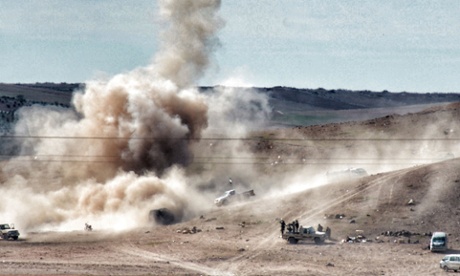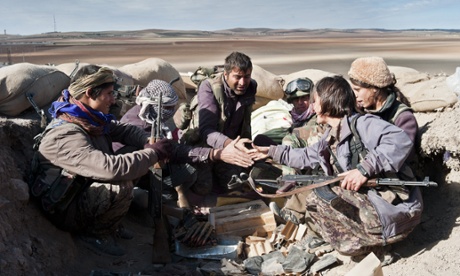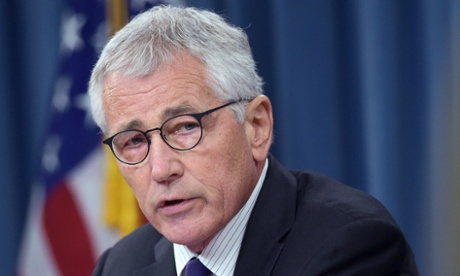Pentagon denies US strategy to defeat Isis is unravelling
Syrian resistance groups criticise Obama administration’s ‘Iraq-first’ strategy as a de facto alliance with Bashar al-Assad while Isis consolidates influence in Anbar province

The Pentagon has denied that the US strategy against Islamic State (Isis) is in disarray after a series of setbacks as the war known as Operation Inherent Resolve stretches into its fourth month.
“I don’t believe that we view current events as a major setback to the goals that we’ve set with respect to training and equipping the moderate opposition” in Syria, said Rear Admiral John Kirby, the Pentagon’s chief spokesman.
Kirby’s remarks came days after an al-Qaida-aligned faction routed one of the Syrian resistance groups on which the US has been depending to anchor an anti-Isis proxy force. The Nusra Front, al-Qaida’s affiliate in Syria, appears now to be allying with Isis, an indication that the Islamist extremist group’s fortunes are rising.
“Obviously, these kinds of developments are certainly not helpful to the security situation writ large, but we don’t view it as a major setback or a major blow to our ultimate objectives,” Kirby told reporters on Tuesday.
Kirby said no decision had yet been made on launching airstrikes against Nusra directly, which would expand the US war against another enemy.
Syrian rebel groups that the US had hoped to align with are criticizing the Obama administration for a de facto alliance with Bashar al-Assad, the dictator whose brutality sparked the gruesome civil war in Syria that is nearing its fifth year. The moderate rebels’ battlefield setbacks and their prioritization of Assad has created an open question about the viability of the planned US proxy force.
The administration insists its opposition to Assad remains ironclad. But Chuck Hagel, the US defense secretary, conceded last week that Assad “derives some benefit” from Washington’s emphasis on Isis. Hagel reportedly urged the White House to clarify its intentions with regard to Assad, which analysts warn is a self-imposed obstacle to building its Syrian proxy force.

Isis has faced stiffer resistance than expected in taking the Syrian Kurdish border town of Kobani, where the US military commander has boasted of taking advantage of the “opportunity” the jihadist army presented. US airstrikes on Isis positions in Kobani occur daily despite the Obama administration’s portrayal of the city as peripheral to its strategy. Yet military officials still caution that Isis may prevail there.
Beyond Kobani, the US war effort, which has already morphed from its initial summer formations, has begun to look dire.
On Tuesday Kirby confirmed that the “vetting process has not yet begun” for the desired proxy Syrian rebel force. While the US has secured facilities to host the training outside Syria, the military has yet to evenannounce an officer tasked with leading the vetting. Once the training gets underway, the Pentagon anticipates that an initial cohort of Syrian proxy units will take the better part of a year to field, and will total approximately 5,000 fighters, against an Isis force that may command as many as 31,000.
US military officials frequently describe their strategy as “Iraq first”, reflecting what some in the administration suggest is a more realistic ambition, compared to the complexity of the neighbouring Syria conflict. The US has renewed its mentorship of the Iraqi military it built during the 2003-2011 occupation. But the administration is signaling that a counteroffensive to oust Isis from Iraq, led by the Iraqis and backed by US airpower and Iranian-supported Shia militias, will not proceed until spring 2015.

In the interim, Isis appears to be consolidating its control over the western Sunni Anbar province. It has executed over 300 members of the Albu Nimr tribe in and near Hit, an apparent warning to the Sunni tribes that rebelled against its former incarnation, al-Qaida in Iraq, against rejecting Isis rule. General Martin Dempsey, the chairman of the US joint chiefs of staff, last week advocated arming the tribes, but suggested that the Iraqi government, still dominated by the Shia, remains hesitant of taking that step.
Election may affect strategy
Tuesday’s congressional elections are likely to have implications for the course of the war. Hagel postponed a planned trip to Asia on Tuesday, partly out of anticipation of testifying about the war and other issues during the lame-duck congressional session that will last through December.
Should Republicans gain control of the Senate, Arizona Republican John McCain will probably become chairman of the influential armed services committee.
A vociferous critic of Obama’s foreign policy generally and his campaign against Isis in particular, McCain favors expanding the war’s aims tooverthrowing Assad as a gambit to convince Syrians to back the US against Isis in return. Obama has resisted that step, fearing subsequent US responsibility for a fractured Syria reminiscent of the painful post-Saddam occupation of Iraq.
Other critics of the war effort urge Obama to refine his goals against Isis even further. Michael Eisenstadt of the Washington Institute for Near East Policy, a right-leaning thinktank, wrote in a new paper that the US ought to “define down success” as a marginalized Isis that can no longer conquer or hold territory. Eisenstadt conceded that even that narrowed endgame, which “could take years to accomplish”, would see Isis persisting as a terrorist group.
“The US needs to be forcing an outcome, and we’re not,” said Christopher Harmer, an analyst with the Institute for the Study of War.
Harmer said Obama was constrained by the public’s “disinterest in frontline involvement”, but lamented that the US was reacting to crises sparked by Isis tactical initiatives ranging from the siege of Yazidis at Mount Sinjar to the fight for the Mosul Dam to Kobani.
“It’s tactically momentarily relevant and strategically incoherent,” said Harmer, a former US navy aviator.
In what has become a refrain at Pentagon press briefings, Kirby pled for public patience with the war. “I know of no military strategy in history that can be judged after only 90 days,” Kirby said.
No comments:
Post a Comment